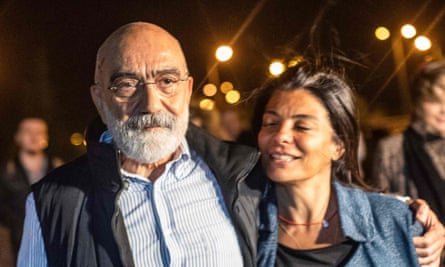The coronavirus has put life on hold. In this time of fractured human contact and fear of the unknown, we need to read authors who will embolden us for the hard season ahead, while also offering a calming sense of perspective.
Eula Biss’s book-length essay On Immunity does the trick. She begins with the story of Achilles, whose mother dipped him in the river Styx only to leave the vulnerable spot on his heel where she held him. The story’s moral, in Biss’s words, is that “immunity is a myth … and no mortal can ever be made invulnerable”. And yet she admits that she found this message hard to accept after the birth of her son in 2009 – especially when, shortly afterwards, the swine flu epidemic began. Biss explores how hard it is for even the most clear-eyed of us not to succumb to panic and dread.
Gradually, though, she drags herself into the knowledge that we are stronger when we face our vulnerabilities collectively. She concludes that “immunity is a shared space – a garden we tend together”. On Immunity reminds us that we are precarious, mortal, dependent beings who need to look after each other. And this will always be true, whether we are facing a public health emergency or not.

Those enduring self-isolation may find it uplifting to read about the heroic efforts of political prisoners to retain their sanity through human connection. The Turkish journalist Ahmet Altan wrote I Will Never See the World Again while serving a life sentence on trumped-charges of treason. This wise and defiant book, composed in a tiny shared cell and smuggled out in notes to his lawyers, celebrates the power of words to dissolve human isolation. “Like all writers, I have magic,” Altan writes. “I can pass through your walls with ease.”
Irina Dumitrescu’s edited collection Rumba Under Fire – available to download free from Punctum – is full of stories of people still managing to write, teach and learn in the cruellest circumstances. Romanian prisoners kept in solitary confinement under the Ceausescu regime share poetry with each other in Morse code, by tapping, coughing or moving their chairs so that they squeak. Siberian prisoners make ink from blackberries so they can write down poems they remember from school. An imprisoned professor of English writes his lectures on string, tying knots for each letter. A 16-year-old prisoner teaches herself English by scratching newly learned words on stolen scraps of soap. These heartening tales put our own troubles into proportion. They show us that the human will, and our inescapably social instincts, usually find a way.
Those who are social distancing, and sitting out the crisis, may find cheer in Katherine May’s recent book, Wintering: How I Learned to Flourish When Life Became Frozen. Wintering, for May, entails “the active acceptance of sadness”. Sometimes we need to hunker down just as nature does, paring back to the basics of existence so we can thrive in sunnier days. Wintering is a time of dormancy, rest and renewal – a time for taking stock and reassessing our priorities. Anything we might achieve is a bonus, not a demand. It may even be a relief to shake off the burden of instant fulfilment and embrace the longer view. “This is the easy time, there is nothing doing,” as Sylvia Plath writes in her poem “Wintering”. “This is the time of hanging on for the bees.”
One good thing, perhaps, is that our crisis is not happening in an actual winter. The open spaces of the countryside will be safe and reviving. For instructions on how to enjoy them, read George Orwell’s essay “Some Thoughts on the Common Toad”, published in April 1946, after a long winter which Orwell had feared might be permanent. “By retaining one’s childhood love of such things as trees, fishes, butterflies, and … toads, one makes a peaceful and decent future a little more probable,” Orwell writes. “At any rate, spring is here, even in London N1, and they can’t stop you enjoying it.” Dark times shouldn’t stop us living our lives and taking joy where we can find it. Spring is here, even in the time of coronavirus, and they can’t touch you for it.
And since the “blitz spirit” keeps being evoked, perhaps you should read Angus Calder’s The Myth of the Blitz to ward against glib or invidious comparisons. Then try Pat Barker’s novel Noonday, set in the actual blitz, or Denton Welch’s story “Memories of a Vanished Period”, about the hedonistic habits of young Londoners during a bombing raid. You will learn that our predecessors, in times of great danger, were just as conflicted, as humanly flawed, and as freaked out, as we are.
